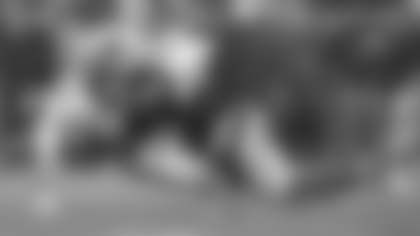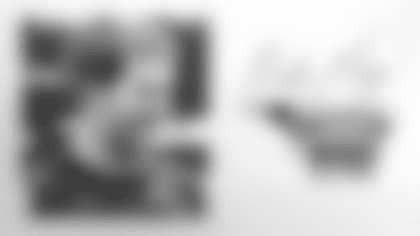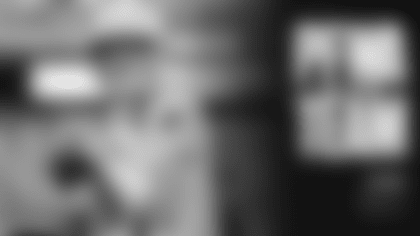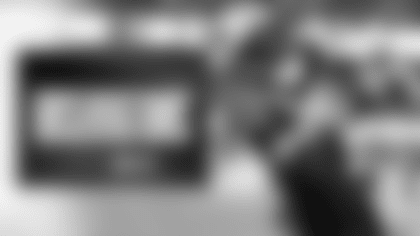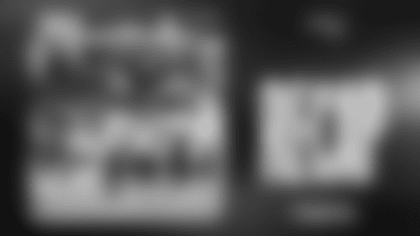PATRIOTS HEAD COACH JEROD MAYO
PRESS CONFERENCE
September 13, 2024
JM: Good afternoon. We had a good work week yesterday. They definitely came out with a lot more energy than they did Wednesday. Wednesday was a little up and down, which is expected at times, just being fully transparent with you guys. But yesterday, I would say they came out and practiced like true professionals. Great energy. Today, we'll clean up all the things over the week. We'll work our way into the red zone, which I would say in regards to the red zone, especially offensively, we've just got to do a better job. We've got to do a better job in the red zone. That has definitely been a point of emphasis. Going into the game, we look to play another complimentary football game, all three phases really going out there performing the way that we expect.
Q: Jerod, yesterday you had three new players on the injury report as well: Kyle [Dugger], JaMycal [Hasty] and Layden [Robinson]. Has that endangered their status or availability for Sunday at all?
JM: Right now, it's still up in the air. We have to see. We have to get through this practice to see how they feel. Really, after they get through the practice, it's how they feel the next day that's really the most important. So, we'll see how that works out.
Q: On the quarterbacks, as you balance Jacoby [Brissett] and Drake [Maye], getting Jacoby ready to play in the game, but develop Drake, do you envision sort of like a 70-30 type split in practices?
JM: Who told you that? Somebody told you that [laughs]? That's definitely accurate. It's not a secret. We have a quarterback in the wings that needs to continue to develop. Normally, I would say the starter gets, let's say, 95% of the reps and the backup doesn't. With this, it's a little bit different. We had a conversation, how do we – I guess the struggle is, how do you get your starting quarterback prepared for the game and also continue to develop the guy in the background, which is Drake. So, it is like a 70-30 split. You're right on the head. We're very thoughtful. When we talk about [how] we have a development plan for Drake, that's part of it. I try not to get too deep into what that plan actually looks like, but he [Drake Maye] still takes reps with the starters. He does a good job on the show team as well. He's doing a good job, and you can see his confidence continuing to grow.
Q: How would you describe the show team?
JM: The show team, so, we always have to get the practice squad players out there to give a good look. What I will say is, and this has been the same over many years where the starters will sometimes take the first two or three reps, which I think is important as well, so they can see what it's going to look like on Sunday. There's nothing more important, and I've expressed this very explicitly to our show team, they [show team] are the most important people during the week in regards to wins and losses on Sunday. So, if they can't go out there and execute a card, then they're not giving us a good look, and now you go into Sunday feeling a little bit unprepared. So, those guys are a mix of starters and also the practice squad. Now in saying that, I would say the way that Eliot [Wolf] and I look at the practice squad is these guys have to get ready to play as well. So, there are certain things where we're evaluating them on their technique on that side of the ball as well. So, it's not just going out there and running cards.
Q: I just didn't know if it was different from the scout team?
JM: Oh, sorry. I could've just said that. It's the scout team. Sorry, my bad. I gave you a whole rant on what it is. No, it's all good.
Q: It's still the Dirty Show?
JM: The Dirty Show, yeah. The Dirty Show, that goes back to Pepper Johnson and all those guys, the Dirty Show team. To go out there and play with good energy and still compete at a high level, I think it's good for the other players that are trying to develop and make our roster.
Q: Regarding the challenge of getting the starter ready and the 70-30, I would imagine that there are a lot of starting quarterbacks that don't want to give up a quarter of the snaps. What is it about Jacoby that he can get ready?
JM: Yeah, since day one, I've always said that he's a true professional. I've always said that he's a great mentor, not only for Drake, but the other quarterback in the room in [Joe] Milton. He understands. Look, he's a professional. He's won games in this league. He understands that we drafted Drake as the No. 3 pick in the draft, and looking out the front windshield, at some point in time – I don't know when that time will come –he'll [Drake Maye] have to go out there and play. Just seeing the relationship in the quarterback room has been special for me. It is very hard. When we talk about checking your ego at the door, I would say that Jacoby is one of those guys that is egoless. He wants to do what's best for the team, not about him. Whether he throws for 150 yards or 350 yards, he's very consistent and just a true professional.
Q: With some injuries at guard, are you guys committed to keeping Mike Onwenu at tackle, or is it still possible that he can move back over to guard?
JM: That's a great question. Especially early in the season, we're still trying to figure out what the best combination looks like. But I will say it's a blessing to have players that have that flexibility, that can move to guard, to tackle, to right, to left and things like that. So, we'll see how it plays out.
Q: Jerod, you mentioned the red zone, and offensively, 1-for-4, I think, last week. What do you see when you watch the film as to some of the reasons? I know there's a million reasons probably, but –
JM: I think the main reason is just maintaining focus and executing. So, as you continue to work in the red area, now the safeties become more in play. The field is shrinking this way, and everything happens a lot faster. So, we just have to be able to process faster and really be tight on executing the plays, and it's not just one person. It's all 11 that's out there. So, to me, that's the biggest thing.
Q: There were some opportunities, maybe, to put the ball in the end zone through the air in the red zone, it seemed like. But AVP [Alex Van Pelt] said that it's kind of like a risk-reward for Jacoby in those spots sometimes. How do you view that in sort of giving guys a chance versus taking the three points?
JM: Yeah, I think that it depends on, I mean, it's a game-by-game basis. That's what I would say, first and foremost. Then, secondly, I would say anytime you're in a red area, you want to walk away with points, whether that's three or seven. The most important thing is that we don't go backwards and that we walk away with points. So, that's my philosophy on that. Now, there'll be times where, you're right, they're going to stack the box, and we have to be able to throw the ball. There'll be other times where as these receivers continue to develop and our tight ends, they want to take those guys away and we run the ball. So, it's really a game-by-game basis.
Q: Jerod, during training camp, a lot of the coaches talked about the use of virtual reality as a tool in quarterback development. Has that been implemented with Drake so far?
JM: Those guys have all used the virtual reality system. Going back to training camp – not to look in the past – you guys asked the question, 'How do these guys get reps?' That's when [Bailey] Zappe was here as well. They have these different tools that they use to get those mental reps, and those are great reps for those guys to get. I know oftentimes, everyone's like, 'Well, what's the practice count? What's this? What's that?' There are different ways that you can get reps mentally, which is important. Did that answer your question? When I was finished with it, I was like, 'Maybe I didn't answer the question.'
Q: How have you seen Drake utilize that tool, given the deduction in practice reps now that the season has started?
JM: Going back to the 70-30, he's still getting reps with the first-team offense at times. He's also getting a lot of reps on the show team. But the virtual reality thing, he uses it every single day and so do the other quarterbacks. So, it's been good.
Q: Jerod, I know this is one week, and you guys partly contributed to this. But in week one, defenses spent 60% of their snaps in two-high. You guys spent a good chunk of your snaps in two-high. That's a big shift in the last five, six, maybe 10 years. Can you speak to that? What do you see in that trend across the league, dropping to that structure more often?
JM: Yeah. When you play two-high structures, I mean, there are a lot of good quarterbacks in this league. There are a lot of good receivers in this league. Sometimes you want to force these offenses to drive the ball. You don't want them to get it all in one play. I would say that's the main thing. Making these offenses drive the ball down the field gives you your best chance to win.
Q: Defensively, when you're looking at a group of receivers that has a diverse set of skills, why is that a challenge? Because it looks like this Seattle group, they are very different, their top three guys.
JM: No, that's right. You try to, as you continue to build out the roster, you try to have defensive backs that can match whatever skill set they want to throw out there. Now, sometimes that doesn't happen. Sometimes you'll have a 6'5" receiver versus a 5'10" corner based on just the roster. Now, that 5'10" corner could be a Pro Bowl player, but there comes a point in time where this guy's parents were taller than your parents, and it's hard to really match. So, going back to the split-safety coverage, you've got to give some help over the top depending on what those matchups look like. So, if you look at a shifty guy, I mean, it's a true double team. If you look at a vertical threat, it's a true split-safety structure. Can I just say – I like to educate you guys on some of these things. This game is all about adjusting on the fly, right? So, if they start to do two-high structures, what does that mean up front? You have one less person in the box. So now, the run game becomes a problem. Same thing if you have a one-high structure. Now they're saying, 'We dare you to run it,' but now the outside – the receivers and those guys – they have to win on the outside. It's just the game within the game, this tug of war that goes back and forth. Now, truth be told, you will want to play a two-high structure and still be able to stop the run. That's when, if you're able to play a two-high structure and stop the run, then you're probably going to have a good day.
Q: Coach, with that cyclical nature of the game, do you see maybe a trend more toward running again? With teams like Josh Allen and Patrick Mahomes, it feels like their team is trying to give them really strong run games. Do you think maybe it's starting to lean more in that direction?
JM: Well, the two quarterbacks that you just named, they're phenomenal, phenomenal players. Look, if you're going to take away all the receivers, that's the right thing to do. That's why we always talk about not having an ego. You can go out as a receiver and have 30 yards catching this week or maybe 150 yards catching this week. So once again, if guys want to start to take away the run game from Buffalo and from Kansas City, then you're going to have to hang in there on the back end. So, that's the back and forth.
Q: With David [Andrews] and Rhamondre [Stevenson], were those just vet days on Wednesday? Do you plan on giving those to guys moving forward?
JM: They both played a lot of snaps in the game, and sometimes they have little nicks and things like that. I fully expect them to play.
Q: Last week, you talked about, 'We've got to control the line of scrimmage, run the ball.' I don't think I remember hearing if you had something similar this week, anything you should be looking out for that you need to do to win the game?
JM: Yeah, for me, we have to see how they want to play us. I would say we have a pretty good game plan either way they want to play us in any phase of the game. We will always look to control the line of scrimmage. We will always look to control the line of scrimmage. We'll always look for ways to control the game. We've all been a part of games where even when we were down, we felt like we really had control of the game. Then, when you're up and you feel like you have control of the game, then that's great. So, not to look in the past, there was a time in that Cincy [Cincinnati] game, we felt like we had pretty good control of the game overall. Then, there was a point in the third quarter where it was like, 'Alright, let's get back to what we did the first half,' and then regained control. So, we'll always look to run the ball, and I feel pretty confident about passing the ball as well.















